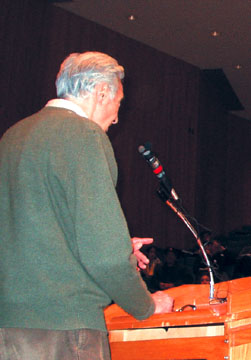“As I write this, it looks like war,” begins Howard Zinn’s recent essay, “War.”
Howard Zinn and Anthony Arnove were at UMB on Thursday, March 5, to speak about the impending U.S.-led war on Iraq. Zinn is a popular author, playwright, and a professor emeritus of political science at BU. Anthony Arnove has edited such works as Iraq Under Siege and Terrorism and war, written by Howard Zinn. He is also a member of the International Socialist Organization, which sponsored the event.
The audience filled the 500-person capacity Lipke auditorium about half-way. Most members were supporters, although it was clear that at least a few present did not agree with the speakers.
Both speakers seemed to see the war as inevitable, feeling that the Bush administration was going to get this war no matter what, despite massive protests and the strong opposition of some UN nations.
Howard Zinn has written such works as A Peoples History of the United States, Vietnam: the logic of withdrawal, You Can’t Be Neutral On a Moving Train and his most recent book Terrorism and War.
Zinn began his speech with an essay question of sorts; “What happens when the bombs start falling on Iraq?” He continued from there with a somber speech mostly about the history of U.S. bombing from World War II to Afghanistan. Zinn’s speech followed Arnove’s, which had already laid out many of the facts of the situation with a good argument against war. Zinn did not repeat much of anything that Arnove said, instead he added much about the effects of the potential war, citing his personal experience.
A former bombardier for the U.S. Air Force, Zinn spoke of killing a lot of civilians in his bombings, saying he had no idea what he was doing at the time, it was just abstractions and numbers of the enemy. “When you’re flying way up there and you drop bombs, it’s very easy to persuade yourself that you’re not doing something terrible.”
Zinn spoke about the deliberate targeting of civilians in bombing during World War II, Vietnam and the first Gulf War.
In his speech Zinn brought up the recent war in Afghanistan. He said that you could not tell from reading the newspapers what the human damage was as a result of our bombing in that country.
“When the bomb was dropped on Hiroshima, at one point President Truman said, ‘We have bombed a military target,'” said Zinn, as he talked about what has been called military targets in the past.
“As the bombing goes on you are going to hear more and more lies coming from administration spokesmen. You will hear about accident after accident after accident. It is not an accident when civilians are killed in bombing,” said Zinn, predicting U.S. officials’ reactions to the war.
In a speech somewhat less emotional than Zinn’s, Arnove spoke at length against the potential war on Iraq. Arnove described the vulnerability of Iraq and the politics of the U.S. attack on the country. Arnove cited many sources, forseeing damaged infrastructure, people relying on food rations, periodic bombardment in the no-fly zone and hospital shortages. Arnove cited many sources in his speech, from New York Times articles, to statements of a former speech writer for George Bush, and even Colin Powell and the website www.whitehouse.gov. Arnove also cited humanitarian aid groups and UN personnel on the ground in Iraq, stating that they indicated that its not a war the U.S. is starting there, its a slaughter.
Arnove also included his thoughts about the U.S. occupation of Iraq following an invasion, saying it could lead to the breakup of OPEC and a destabilization of the region due to reactions of Arab countries to U.S. leadership in Iraq.
“The stakes are becoming higher for the Bush administration and therefore it is all the more important that those of us who oppose this war organize, mobilize and plan the means to voice our opposition to this rush towards war,” said Arnove during his speech.
“This war comes at a time of cuts in social spending, student aid, health care, job training, and the Bush administration is running up the deficit and giving tax cuts to the rich,” said Arnove in his final statement.
During the open discussion, Jonathan Howe, an audience member posed the question, “What alternative to war do you have to deal with this tyrant?” He expressed his feelings that war is the only alternative and compared Saddam Hussein to Adolf Hitler, and the current situation with the beginning of World War II.
Zinn responded, saying that the Iraqi leader is a fifth-rate military power that isn’t invading anyone. “There are many tyrants in power,” said Zinn.
When Zinn commented that the country that’s expanding is the U.S., not Iraq, the audience applauded.
Arnove added that this is an artificial crisis and went into some of the history of the relations between the U.S. and Iraq.
When interviewed after the forum, Howe stated Arnove and Zinn didn’t really say much between the lines. He also said that in the open discussion at the end there wasn’t really a debate, people were just trying to make speeches.
When briefly interviewed following the forum, Mitch Lewis, event organizer and a member of the International Socialist Organization said it was a “smashing success.” Lewis also expressed some of his viewpoints about the political situation. “As a socialist I want to see a society where human need is what dictates how society is run and not the profits of Bush and his oil men.”

